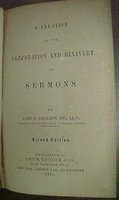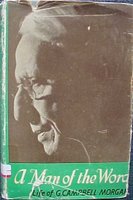
 Twice a year, my family and I travel south to see relatives in Georgia. One year, on our return trip home, we stopped in Louisville, KY at the Southern Baptist Seminary. Although I grew up Southern Baptist, I left the SBC in the late 70s because of the unrestrained liberal theology being taught in its schools and seminaries. In recent years, the Southern Baptists have moved toward a somewhat more conservative theology.
Twice a year, my family and I travel south to see relatives in Georgia. One year, on our return trip home, we stopped in Louisville, KY at the Southern Baptist Seminary. Although I grew up Southern Baptist, I left the SBC in the late 70s because of the unrestrained liberal theology being taught in its schools and seminaries. In recent years, the Southern Baptists have moved toward a somewhat more conservative theology.However, I appreciate the heritage that Baptists have. One of my favorite Baptists of the past is John Broadus, a very well-known and popular preacher and theologian in the late 1800s. He wrote a best-selling book on preaching, first published in 1870, a book he thought no one would buy but is still in print today. I collect early editions of this book and have 11 different copies, including an 1871 2nd printing. The seminary in Louisville, where Broadus taught, has the original handwritten manuscript of his book. The library archives were kind enough to let me see and handle this 140 year old document. In the archives room, with white gloves, I looked page by page on the elegant handwriting of a man who first taught this material after the Civil War to one, blind homiletics student.
In today’s churches, we don’t have preachers. We have communicators, marketing specialists, leadership specialists, and executive pastors. Where are the preachers? Where are the men (I use that particular noun on purpose) who proclaim from a pulpit (not a stage) solid Biblical content with holy passion? Where are the men who will spend many hours every week in their study (not office) with the Lord God and His Word?
If the Bible is truly what it claims to be—the only authoritative revelation from the true God—then people do not need sermonettes, homilies, or reworked versions of current best-sellers. People need to hear something beyond what they can get at any good bookstore or TV discussion program. People need hope, encouragement, faith, and, at times, confrontation. Only the passionate proclamation of the Bible will meet the real needs of the human heart and soul.
Quintilian, a famous 1st century Roman orator, wrote in The Orator’s Education that the good orator must also be a good man (Book One, Prooemium).
Do we have any good men today? Do we have any men who will immerse themselves in the fantastic truths of the Bible, in their study early in the morning, practicing self-discipline and planned neglect, limiting the influence of other activities on their time? Do we have any men who know that their primary duty is to be "men of the Book", so saturated with the Word of God that, when they stand before hurting people, the answers and conviction are obvious?
David Martyn Lloyd-Jones, a well-known British pastor said that " when the pulpit is right, and the preaching is true, that it will attract and draw people to listen to its message." Charles Spurgeon, another well-known British pastor, said that with many preachers "the polish of the rhetoric is greatly in excess of the weight of the doctrine." G. Campbell Morgan, Lloyd-Jones’ predecessor at Westminster Chapel and of whom I have about 90 books from his personal library, said that the essentials of a sermon can be condensed to three words: Truth, Clarity, Passion. Yet these three qualities are often missing in many pulpits.
Quintilian, a famous 1st century Roman orator, wrote in The Orator’s Education that the good orator must also be a good man (Book One, Prooemium).
Do we have any good men today? Do we have any men who will immerse themselves in the fantastic truths of the Bible, in their study early in the morning, practicing self-discipline and planned neglect, limiting the influence of other activities on their time? Do we have any men who know that their primary duty is to be "men of the Book", so saturated with the Word of God that, when they stand before hurting people, the answers and conviction are obvious?
David Martyn Lloyd-Jones, a well-known British pastor said that " when the pulpit is right, and the preaching is true, that it will attract and draw people to listen to its message." Charles Spurgeon, another well-known British pastor, said that with many preachers "the polish of the rhetoric is greatly in excess of the weight of the doctrine." G. Campbell Morgan, Lloyd-Jones’ predecessor at Westminster Chapel and of whom I have about 90 books from his personal library, said that the essentials of a sermon can be condensed to three words: Truth, Clarity, Passion. Yet these three qualities are often missing in many pulpits.
Today, we have weak pulpits and anemic theology. Churches that have 45 minutes of music and then a 15 minute sermonette are contributing to the slow destruction of Bible Christianity in our time. The preaching of the Bible is a noble and essential calling. Hebrews 10:25 instructs the people of God not to abandon their assembling together, especially as they see the return of Christ draw near. As God’s people obey the Word, the preachers of God must have something for them to hear, something that will draw people Sunday morning and, yes, Sunday night.
The Bible is full of wonderful truth, yet our eyes are naturally closed to those truths (Ps 119:18). May the first set of eyes to be opened be those of the pastor.